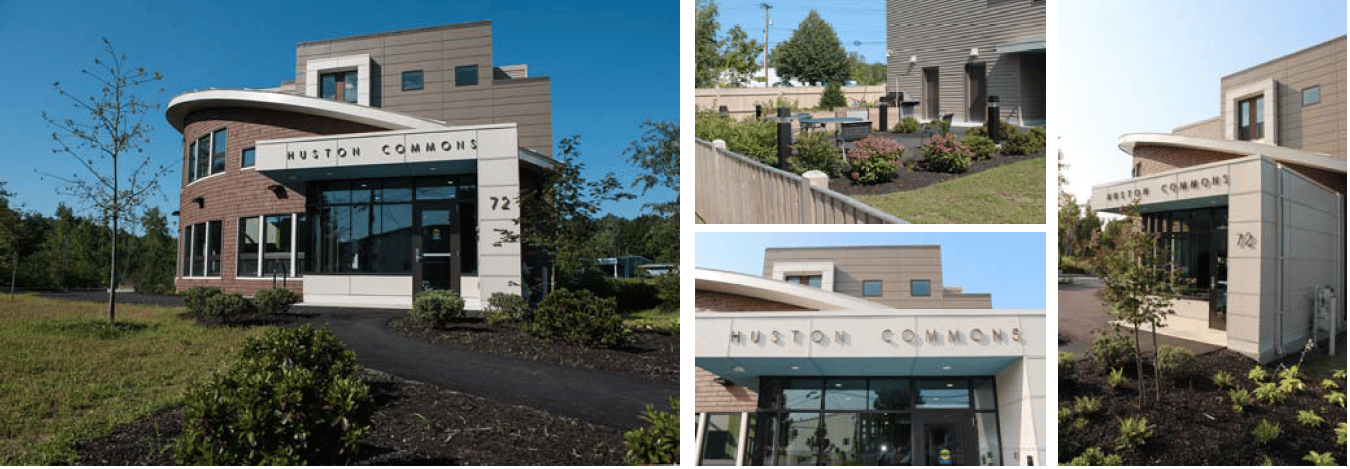The Right Equation for Responsible Development: Spotlight on Huston Commons
In a multi-part series, exclusive to the Maine Real Estate Insider, we’ll provide an up-close look at the most notable commercial development projects of the past year that are helping to fuel Maine’s economy in terms of investment and job creation. MEREDA is proud to recognize responsible development based upon criteria including environmental sustainability, economic impact, energy efficiency, social impact and job creation.
Please join with us in celebrating Huston Commons.

MEREDA: Describe the building and project.
Huston Commons: Huston Commons is a Housing First development for 30 disabled individuals who have experienced chronic homelessness. Through a unique series of nonprofit collaborations, Huston Commons provides essential 24-hour support services, including a medical care room to accommodate regular practitioner hours and telemedicine services for residents, all of whom have disabilities. Avesta Housing is the developer and property manager for Huston Commons, and Preble Street provides 24/7 support services. The project includes a partnership with Greater Portland Health to address specific health concerns and more generally ensure that residents have access to the health and personal care services that medically-compromised individuals typically benefit from in their homes. The onsite medical care room allows Greater Portland Health to schedule regular practitioner hours and telemedicine services for use in treating residents. Portland Housing Authority provides rental assistance to all of the residents to make the rent affordable.
MEREDA: What was the impetus for this project?
Huston Commons: The impetus for this project was an urgent need for safe, affordable, permanent housing for homeless individuals in Portland. The target population for Huston Commons is disabled, medically-vulnerable individuals who are experiencing chronic homelessness. There is an immense need for permanent supportive housing for chronically homeless individuals in the Portland area. The number of people seeking emergency shelter has increased by 20% over the past four years, and City shelters have been full for years, creating the need for the continued maintenance of overflow shelters. These overflow shelters have also become filled to capacity, forcing dozens of people to spend their nights sitting in chairs in local government offices or worse. Maine’s most recent annual Point-in-Time survey identified 1,200 experiencing homelessness statewide, and more than half identified themselves as having a chronic disability. In Portland, 497 people were identified as experiencing homeless, and 48% had a chronic disability. A Task Force on Homelessness was formed by the Portland City Council in December 2011 to create a strategic plan to prevent and end homelessness, and one of its key recommendations was the development of three “Housing First” projects with in-house supportive services for residents. Huston Commons represents the first of those three projects. Studies have shown that such Housing First projects achieve savings by reducing the need for shelter stays, emergency room visits, jail stays and mental health hospitalizations.
MEREDA: That sounds like quite a process. How long were you in the planning stages before construction started?
Huston Commons: We began working with City officials to identify a site in early 2014, applied for and received an allocation for tax credits in late 2014, received planning board approval in July 2015, and began construction in April 2016.
MEREDA: Tell us about the most challenging aspect of getting this project completed.
Huston Commons: Huston Commons had a unique development challenge in that the property it sits on had three separate zones running through it. Avesta Housing worked closely with the City of Portland to convert the three zones into one new zone to allow for the construction of Huston Commons.
MEREDA: Something unexpected you learned along the way was…
Huston Commons: Working with mentally and physically handicapped individuals who have been homeless for as much as a decade prior to moving in presents copious challenges that need to be addressed by the entire team – property management, support services, etc.
MEREDA: Now that it’s complete, what feature of the project do you think makes it the most notable?
Huston Commons: The number of people seeking emergency shelter in Portland has grown 20% over the past four years. Homelessness is a growing problem with shrinking budgets and solutions. All 30 units are restricted to individuals who have experienced chronic homelessness and have medical challenges. Needless to say, Huston Commons filled up rapidly. Between Avesta’s three Housing First properties in Portland, there are over 100 people on the waitlist – all of whom are homeless today, most of whom have been homeless for quite awhile. The feature of this project that is most notable is its ability to serve our community’s most vulnerable residents with the help of unique organizational partnerships.
